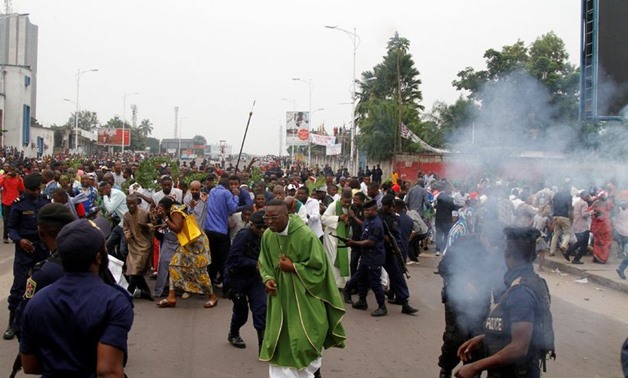
Riot police officers fired tear gas during a protest in Kinshasa, the capital of the Democratic Republic of Congo, on Sunday. Credit Kenny Katombe/Reuters
KINSHASA - 26 February 2018: At least two people were killed and dozens more injured on Sunday when security forces in Democratic Republic of Congo cracked down on church-led demonstrations against President Joseph Kabila, the United Nations said.
Catholic and evangelical churchgoers across Congo had meant to take to the streets following Sunday services, but they were met with police and soldiers deployed to stop them.
In addition to the dead, who were killed in the capital Kinshasa and the western city of Mbandaka, the head of Congo's U.N. mission, Leila Zerrougui, said 47 people were injured and more than 100 were arrested across the country.
She called on the Congolese authorities to carry out credible investigation into the incidents and impose appropriate sanctions.
National police spokesman Colonel Pierrot Mwanamputu told state broadcaster RTNC that there had been no deaths and only three people were wounded in Sunday's violence.
In power since 2001, Kabila struck a deal with the main opposition bloc to stay on after his elected mandate expired in December 2016, but authorities missed a deadline to hold elections last year as required under the agreement.
Officials have hinted that a new December poll date may not even be possible due to financial and logistical constraints.
Church groups have emerged as the main force opposing Kabila as political opposition parties have been hobbled by infighting or seen their leaders forced into exile.
"Our people no longer believe in the political will of our current leaders to ensure a peaceful transition of power," one of the main organising groups, the Lay Coordination Committee (CLC), said in a statement before the march.
The organisers are demanding the prompt organisation elections and a pledge from term-limited Kabila not to stand for re-election.
However, armed security forces surrounded Kinshasa's main churches and blocked roads, preventing most demonstrations from starting and in some cases using teargas and gunfire to disperse them.
NATIONWIDE PROTESTS
The march organisers, the CLC, said it had confirmed three deaths on Sunday, one more than the UN - two in Kinshasa and one in Mbandaka. The figures could not be independently verified. Witnesses and rights groups also reported violence in the northern city of Kisangani.
"I arrived back home without my family ... Everyone fled in a different direction," said one Kisangani resident, who was forced to flee gunfire that erupted after church services there and asked not to be identified.
A heavy deployment of soldiers and police were visible on the streets of other cities, including Goma, the largest city in eastern Congo.
As with previous protest marches, internet, mobile data and phone messaging were cut across Congo early on Sunday, making it difficult to confirm instances of violence. Those networks began to be restored by the evening.
Witnesses who brought the body of one slain man, which was seen by a Reuters reporter, to a hospital in Kinshasa said police shot him outside a church in the Lemba neighbourhood.
Campaign organisation Human Rights Watch (HRW) identified him as Rossy Mukendi, 36, an assistant university professor who set up a citizens action group called Collectif 2016.
Security forces killed about a dozen civilians during two previous marches organised by Catholic activists since December.
The crackdowns have drawn international condemnation and stoked fears Congo could be sliding back towards the kind of war in which millions died at the turn of the century.
"There will be no respite for the government in place as long as we have not recovered our dignity and our liberty," the CLC said in a statement on Sunday.


Comments
Leave a Comment